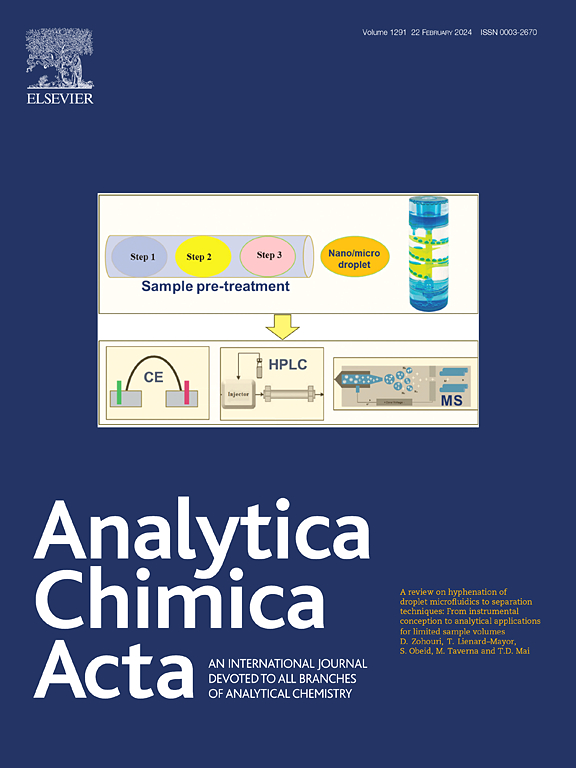Precise detection of the low-quality cooking oil by monodisperse droplet generation in a flow-focusing microdroplet generator
IF 5.7
2区 化学
Q1 CHEMISTRY, ANALYTICAL
引用次数: 0
Abstract
Background
To precisely and efficiently detect the low-quality cooking oil is of great importance to guarantee the food safety in our daily life. Due to the complexity of its origin, the convenient and effective detection methods are still under research.
Results
In a flow-focusing microdroplet generator, a new method is provided to detect the low-quality cooking oil based on droplet microfluidics. By controlling the driving pressure of the continuous and the disperse phase, monodisperse water-in-oil droplets can be formed in the flow-focusing microchannel. In particular, as the droplet size is varying with the fluid viscosity and the viscosity of the low-quality cooking oil is different from that of the high-quality cooking oil, therefore, various types of the edible oil samples can be distinguished by measuring the droplet size. Especially by using the method of image processing, the size of the droplets can be measured accurately in the flow-focusing microchannel, which can significantly improve the detection accuracy of the low-quality cooking oil.
Significance
In particular, for a specific design of the flow-focusing microdroplet generator, this new method can also provide high reliability for the detection of the deep refined cooking oil based on droplet microfluidics.

用流动聚焦微液滴发生器产生单分散液滴的方法精确检测劣质食用油
在日常生活中,准确、高效地检测劣质食用油对保障食品安全具有重要意义。由于其来源的复杂性,方便有效的检测方法仍在研究中。结果在流动聚焦微液滴发生器中,提出了一种基于微液滴微流体的劣质食用油检测新方法。通过控制连续相和分散相的驱动压力,可以在流动聚焦微通道中形成单分散的油包水液滴。特别是,由于液滴大小随流体粘度的变化而变化,而劣质食用油的粘度与优质食用油的粘度不同,因此,通过测量液滴大小可以区分各种类型的食用油样品。特别是采用图像处理的方法,可以准确测量流动聚焦微通道中液滴的大小,可以显著提高对劣质食用油的检测精度。特别是对于流动聚焦微液滴发生器的具体设计,该方法也可以为基于微液滴微流体的深度精制食用油检测提供高可靠性。
本文章由计算机程序翻译,如有差异,请以英文原文为准。
求助全文
约1分钟内获得全文
求助全文
来源期刊

Analytica Chimica Acta
化学-分析化学
CiteScore
10.40
自引率
6.50%
发文量
1081
审稿时长
38 days
期刊介绍:
Analytica Chimica Acta has an open access mirror journal Analytica Chimica Acta: X, sharing the same aims and scope, editorial team, submission system and rigorous peer review.
Analytica Chimica Acta provides a forum for the rapid publication of original research, and critical, comprehensive reviews dealing with all aspects of fundamental and applied modern analytical chemistry. The journal welcomes the submission of research papers which report studies concerning the development of new and significant analytical methodologies. In determining the suitability of submitted articles for publication, particular scrutiny will be placed on the degree of novelty and impact of the research and the extent to which it adds to the existing body of knowledge in analytical chemistry.
 求助内容:
求助内容: 应助结果提醒方式:
应助结果提醒方式:


